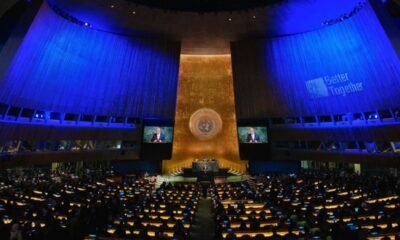INTERNACIONAL
Henrique Capriles fue expulsado del partido Primero Justicia por respaldar las elecciones legislativas convocadas por Maduro

El partido opositor venezolano Primero Justicia (PJ) anunció este lunes la expulsión del dirigente político Henrique Capriles Radonski y de otros cinco miembros, a quienes acusó de actuar en contra de la línea unitaria acordada por la oposición y de favorecer al régimen de Nicolás Maduro al inscribirse en los comicios legislativos y regionales convocados por la dictadura para el 25 de mayo.
La decisión fue comunicada por la dirección nacional del partido mediante un comunicado difundido en su perfil oficial en la red social X.
Según PJ, los expulsados “traicionaron la unidad y el mandato popular” al participar en un evento que se desarrolla, según el texto, “al margen de la unidad democrática” y “en abierta contradicción con lo aprobado por el Comité Político Nacional”.
Además de Capriles, la medida afecta al ex secretario general del partido Tomás Guanipa, a la fundadora Amelia Belisario, al coordinador político nacional Ángel Medina, al ex gobernador del estado Zulia Pablo Pérez, y al ex diputado Juan Requesens, conocido por su rol en las protestas de 2014.
PJ señaló que la participación de estas figuras en los comicios de mayo no representa una iniciativa aislada, sino una conducta progresiva que se distanció del “mandato expresado por millones de venezolanos” en las elecciones del 28 de julio de 2024, y de la estrategia respaldada por la Plataforma Unitaria Democrática, del presidente electo, Edmundo González Urrutia, y del liderazgo de María Corina Machado.
La dirección del partido calificó de “especialmente indignante” que Capriles y Guanipa hayan sido “habilitados selectivamente”, a pesar de que hasta hace poco estaban inhabilitados políticamente.
Denunció que ambos negociaron con el régimen y se beneficiaron de una tarjeta electoral otorgada mientras que los partidos opositores “legítimos” permanecen “judicializados y secuestrados por el poder”.
En el comunicado, PJ recordó que en Venezuela siguen existiendo presos políticos, dirigentes en la clandestinidad y otros en el exilio. En ese contexto, sostuvo que quienes aceptan participar en procesos convocados por el chavismo contribuyen a la normalización de un sistema político “sin garantías ni condiciones democráticas”.

Por su parte, Henrique Capriles rechazó públicamente su expulsión. En una declaración difundida también por redes sociales, aseguró que desconoce la autoridad de la actual dirección del partido, la cual considera “secuestrada” por su fundador, Julio Borges.
“No existe autoridad para ejercer expulsiones por la participación electoral, ni tampoco reglamentos que se respeten”, afirmó Capriles, quien acusó a Borges de imponer una agenda marcada por la “inacción”.
Capriles, que fue candidato presidencial en 2012 y 2013, defendió su decisión de concurrir a las elecciones de mayo al considerar que “el voto es una herramienta de lucha”.
En sus palabras, abstenerse “solo beneficia la tragedia que representa para los venezolanos Nicolás Maduro”. También señaló que las elecciones presidenciales del 28 de julio de 2024 constituyen “el hecho político más importante de los últimos años”, y que su deber es insistir en participar cada vez que exista la posibilidad de ejercer el sufragio.
En ese sentido, subrayó: “Creemos firmemente en que nuestro deber es acompañar a los venezolanos en la búsqueda de un cambio y que eso pasa por persistir en nuestro derecho que es el voto”. Según Capriles, la participación no representa una renuncia a la lucha sino una vía para “lograr un mejor país”.

En reacción a la postura de Capriles, el dirigente opositor Juan Guaidó lo acusó de haber abandonado su rol como referente democrático.
“Quien fue dos veces candidato presidencial de la oposición pone fin, de forma definitiva, a su trayectoria como referente democrático”, afirmó.
Guaidó criticó que Capriles se inscribiera “en una lista inconstitucional”, dividiera el partido que fundó y se presentara a “un proceso fraudulento”.
A juicio de Guaidó, el chavismo ha logrado reducir a Capriles “a una pieza funcional dentro de un sistema que pretende perpetuarse”, lo cual calificó como un “hecho lamentable que merece reflexión”.
También advirtió que enfrentar a una dictadura exige firmeza, y que los intentos por validar procesos organizados por el régimen solo debilitan la causa democrática.
(Con información de Europa Press)
políticos,referendo sobre la disputa con guyana – votaciones sobre la anexión de la guyana esequiba a venezuela. referéndum sobre el esequibo,territorio que se disputa venezuela con guyana
INTERNACIONAL
Punto por Punto: en qué consiste el plan de Trump para poner fin a la guerra en Gaza
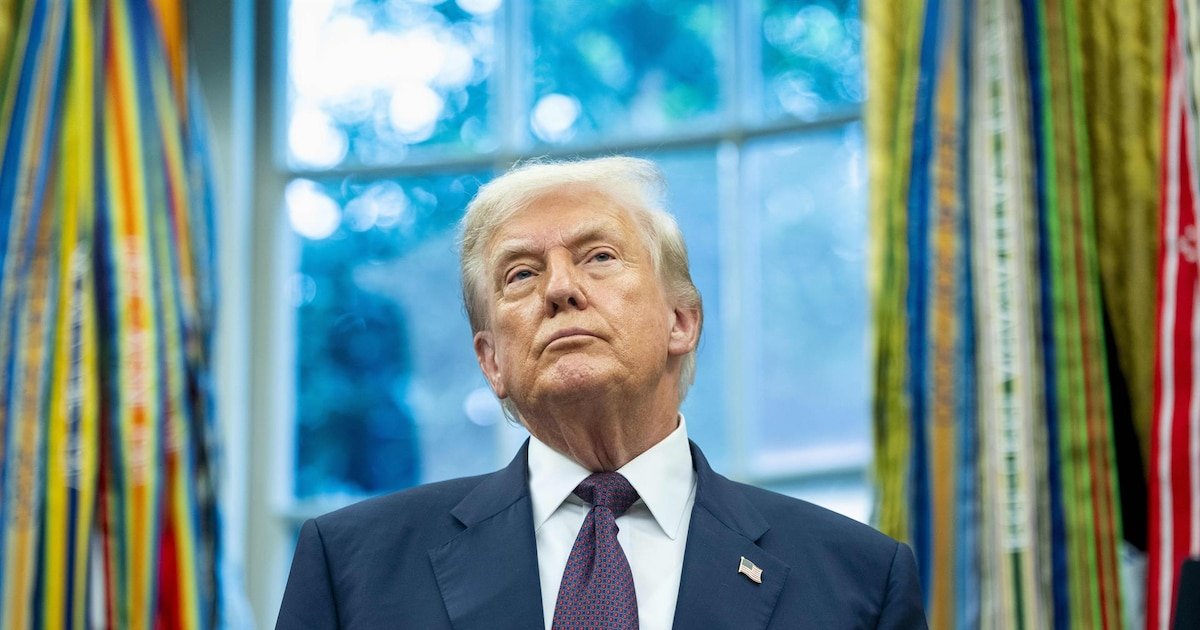
El presidente de Estados Unidos, Donald Trump, anunció que Israel y el grupo terrorista Hamas llegaron a un acuerdo para un intercambio de rehenes por prisioneros, en el marco de la primera fase de un plan global para la finalización de la guerra en Gaza.
El plan, estructurado en 20 puntos, establece los pasos a seguir en la zona de Medio Oriente. El primer punto del esquema establece que Gaza debe convertirse en “una zona desradicalizada y libre de terrorismo para que no represente una amenaza para sus vecinos”. La segunda cláusula agrega que el enclave “será reconstruido para beneficio de su población, que ha sufrido más que suficiente”.
El tercer apartado fija la condición de que, si ambas partes aceptan, “la guerra terminará inmediatamente”. Israel deberá retirarse a la línea acordada para preparar la liberación de los cautivos, mientras se congelan las operaciones militares. El cuarto punto impone un plazo estricto: “Dentro de las 72 horas de que Israel acepte públicamente este acuerdo, todos los rehenes, vivos y muertos, serán devueltos”.

El quinto punto establece el componente recíproco: tras la liberación de los rehenes, Israel pondrá en libertad a “250 prisioneros condenados a cadena perpetua, además de 1.700 gazatíes detenidos después del 7 de octubre de 2023, incluidas todas las mujeres y niños”.
También se estipula que, por cada rehén fallecido que se devuelva, Israel entregará “los restos de 15 gazatíes”.
El sexto punto aborda el tratamiento de los combatientes de Hamas. Quienes se comprometan a la “coexistencia pacífica y a entregar sus armas” recibirán amnistía, y quienes deseen salir de Gaza contarán con un pasaje seguro hacia otros países.
El séptimo compromiso abre la puerta a la asistencia humanitaria: “Al aceptarse este acuerdo, la ayuda ingresará inmediatamente en Gaza”, con volúmenes mínimos iguales a los pactados en el acuerdo del 19 de enero de 2025, incluyendo reparación de infraestructuras esenciales.
Según el octavo apartado, la distribución de esa ayuda quedará en manos de la ONU, la Cruz Roja y otras instituciones neutrales. El cruce de Rafah se abrirá en ambas direcciones bajo el mismo mecanismo del acuerdo de enero.
El noveno punto crea un gobierno provisional: Gaza quedará bajo la administración de un “comité tecnocrático palestino, apolítico, con supervisión internacional de una ´Junta de Paz´, encabezado por Donald Trump y figuras como Tony Blair”, encargado de la financiación de la reconstrucción hasta que la Autoridad Palestina pueda asumir el control.
El décimo punto introduce un “plan económico de Trump para reconstruir y revitalizar Gaza”, a cargo de expertos en desarrollo urbano del Medio Oriente. El undécimo crea una “zona económica especial con tarifas preferenciales y acceso negociado con países participantes”. El duodécimo apartado garantiza que “nadie será forzado a salir de Gaza”, aunque quienes deseen emigrar pueden hacerlo con derecho de retorno.
El punto trece excluye al grupo terrorista Hamas del futuro político del enclave: “Hamas y otras facciones acuerdan no tener ningún papel en el gobierno de Gaza, directa o indirectamente”. Todo el arsenal militar será destruido bajo supervisión internacional, con un programa de recompra de armas y reintegración financiado por donantes externos. El decimocuarto punto asegura la participación de actores regionales en la vigilancia del cumplimiento de las obligaciones para garantizar que “la nueva Gaza no represente una amenaza”.

El decimoquinto establece una Fuerza Internacional de Estabilización, que “se desplegará de inmediato en Gaza” para entrenar a la policía local y cooperar con Egipto e Israel en el control fronterizo. El decimosexto compromete a Israel a no ocupar ni anexar el territorio, con una retirada progresiva en función de la desmilitarización, conservando solo un perímetro de seguridad transitorio.
El decimoséptimo apartado prevé medidas de ayuda y reconstrucción en zonas “libres de terrorismo” bajo control internacional en caso de que Hamas dilate o rechace el plan.
El decimoctavo punto impulsa “un proceso de diálogo interreligioso basado en la tolerancia y la coexistencia”. El decimonoveno sugiere que “al avanzar la reconstrucción y cumplirse el programa de reforma de la Autoridad Palestina”, podrían darse condiciones para avanzar hacia “la autodeterminación y el Estado palestino”.
El vigésimo y último punto establece que Estados Unidos “abrirá un diálogo entre Israel y los palestinos para acordar un horizonte político de coexistencia pacífica y próspera”.
(Con información de AFP y EFE)
Domestic,Politics,North America,Government / Politics
INTERNACIONAL
A dizzying ride on the Hill: Lawmakers debate in circles as shutdown enters week two
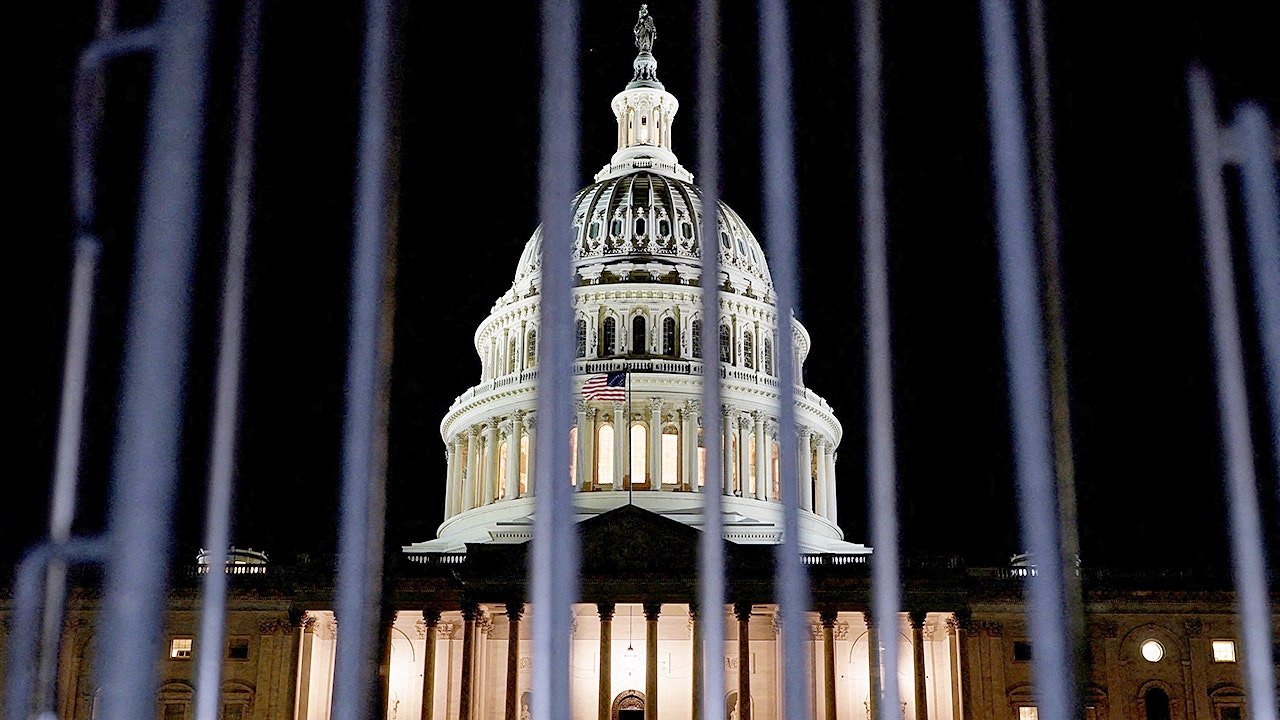
NEWYou can now listen to Fox News articles!
It must be something about October and two-year intervals in Congress.
Congress was paralyzed for more than three weeks without a leader two years ago this October as the House unceremoniously ousted former Speaker Kevin McCarthy, R-Calif.
And Congress is paralyzed again this October – unable to find the votes to re-open the government.
«There’s nothing for us to negotiate,» said House Speaker Mike Johnson, R-La. «We did the job to keep the government open. And now it’s on the Senate Democrats.»
OMINOUS RED AND ORANGE SKIES HAD CAPITOL HILL TAKE NOTICE AS SHUTDOWN LOOMED
But Democrats say that’s the problem. There haven’t been negotiations. Save for a brief White House meeting last week between President Trump and the top four bipartisan, bicameral Congressional leaders a day before the shutdown.
«The Majority Leader in the Senate, John Thune, R-S.D., talks about, ‘we’ll have conversations.’ We need more than conversations. We need a real negotiation,» said Sen. Mark Kelly, D-Ariz., on Fox.
So there are no talks. And the sides are seemingly talking past each other.
It seems as though Congress is positively heading nowhere as shutdown negotiations drag on. (Elizabeth Frantz/Reuters)
So, they’ve turned to handicapping.
Sen. John Kennedy, R-La., gamed out that the shutdown would run another week.
«It won’t end until everybody in the Senate takes their ego out back and shoots it. And then it’ll end,» predicted Kennedy.
It always is, and always will be about the math.
Senate Republicans can conjure up the votes of 55 senators to break a filibuster on the House-passed bill to fund the government. But they need 60 yeas. And Republicans are determined to stick to their playbook.
«I can tell you there’s more than five Democrats in the Senate who know that (Senate Minority Leader) Chuck Schumer, D-N.Y. has led them into a box canyon with this Schumer shutdown,» said Sen. Tom Cotton, R-Ark., on Fox. «But the consequences will start to pile up.»
REPORTER’S NOTEBOOK: SENATE REVOTES TODAY ON ENDING GOVERNMENT SHUTDOWN
White House spokeswoman Karoline Leavitt wouldn’t directly answer a question about what would trigger federal firings. But Leavitt made clear that jobs hung in the balance.
«We don’t want to see people laid off. But unfortunately, if this shutdown continues, layoffs are going to be an unfortunate consequence of that,» said Leavitt.
Democrats excoriated the Trump Administration for hinting it would cut programs and jobs in agencies important to Democrats.
«Americans really hate bullies. And this kind of bullying from the White House is going to backlash because they understand that an authoritarian president uses grants to New York for infrastructure, laying off workers, deliberately inflicting pain,» predicted Sen. Richard Blumenthal, D-Conn. «Don’t inflict unnecessary pain and then boast about it.»
Some Republicans practically reveled in the White House approach.
«All’s fair in love and war. I think that there’s a price to pay for the Democrats shutting this down,» said Sen. Roger Marshall, R-Kan. «These will be part of the consequences.»
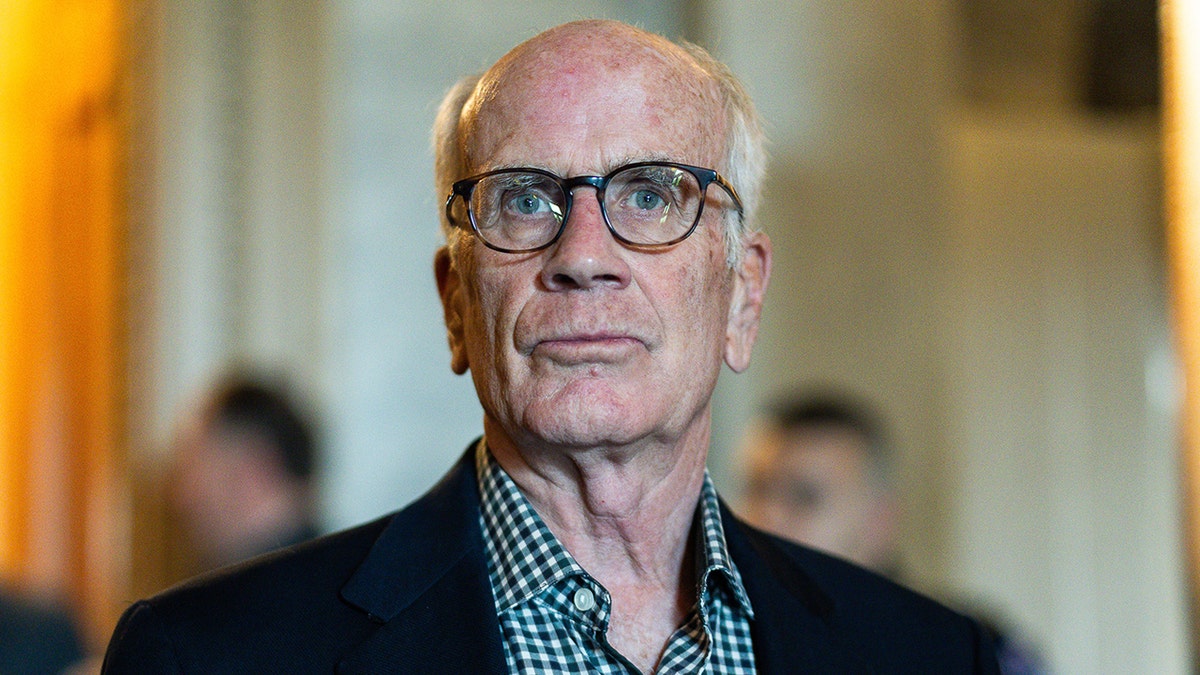
Sen. Peter Welch, D-Vt., argued that the shutdown is «collective punishment» and undercuts Republicans equally harshly. (Tierney L. Cross/Getty Images)
But one Democrat argued that the Trump administration’s gambit would also undercut Republicans and voters who supported the president. Even in blue states.
«There’s a lot of folks in Vermont, there’s lot of folk in Illinois who voted for President Trump. So this sort of collective punishment,» said Sen. Peter Welch, D-Vt., on Fox. «I think it’s a really bad idea.»
But the president is coy about when the shutdown could trigger federal layoffs.
«It could,» said the president. «At some point it will.»
Transportation Secretary Sean Duffy noted that his department saw «a slight uptick» in aviation safety employees who were calling out sick during the shutdown – since they weren’t being paid.
«They’re thinking about how am I going to get a paycheck? How do I make a car payment,» said Duffy.
WHITE HOUSE ESCALATES SHUTDOWN CONSEQUENCES AS DEMOCRATS SHOW NO SIGNS OF BUDGING: ‘KAMIKAZE ATTACK’
But if you squint, you can see a few signs of bipartisanship.
Johnson is discussing Obamacare subsidies with one prominent Democrat.
«I had I think a fruitful discussion, with Sen. Patty Murray, D-Wash., about two days ago, a day or so ago,» said Johnson on efforts to address looming Obamacare premium spikes. «Whatever the conference committee comes up with, I will put on the floor. I’m ready to go.»
But Schumer is skeptical about the Speaker’s promises.
«Delay has always been Speaker Johnson’s MO. Speaker Johnson has survived by kicking the can down the road,» said Schumer. «When Johnson says later, they know he means never.»
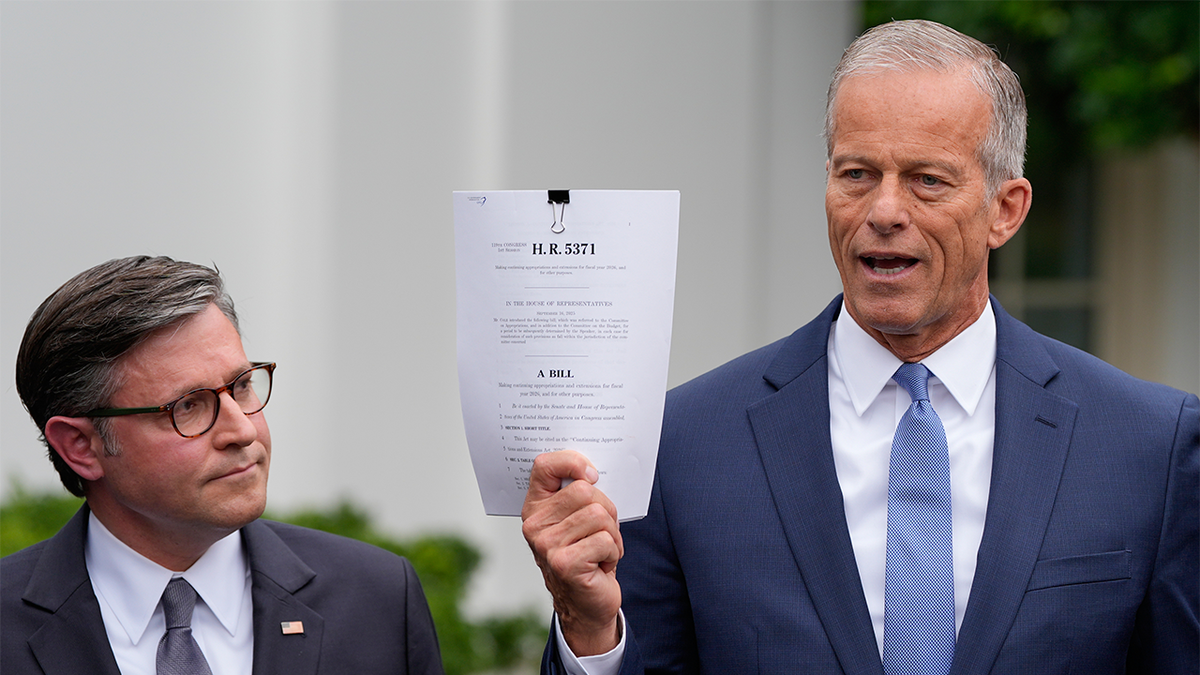
Senate Majority Leader John Thune, R-S.D., insists Democrats are «playing a losing game.» (Alex Brandon/AP Photo)
Tension is building as the shutdown barrels into its second week as lawmakers spin in circles.
«I realize that my Democrat colleagues are facing pressure from members of their far left base. But they’re playing a losing game here,» said Thune.
But each side is now engaged in a game of parliamentary chicken. Republicans won’t budge from their demand that Senate Democrats approve their funding plan. And Democrats won’t relent from their insistence that the sides shore up Obamacare subsidies.
«I’m not going to vote to reopen the government until I see a way that we can do that,» said Sen. Chris Coons, D-Del.
Even some Republicans worry about Obamacare price spikes.
«There are some folks in what is the new part of the Republican Party, which is blue-collar workers,» said Rep. Jeff Van Drew, R-N.J., on Fox Business. «We have to be careful how we do this. We just shouldn’t cut it. We should make sure we use a scalpel and not a sledgehammer.»
SHUTDOWN IGNITES STRATEGIST DEBATE: WILL TRUMP AND GOP PAY THE POLITICAL PRICE IN 2026?
But even if bipartisan senators were to forge a deal, the plan may slam into a brick wall in the House.
«Republicans have spent most of their careers being against Obamacare. Why would they expand it and add a subsidy on top of a subsidy?» asked House Appropriations Committee Chairman Tom Cole, R-Okla.
A debate is now raging over which side will cave. Or which party faces political consequences.
Naturally, Republicans believe Democrats will pay a price.
«Their radical base just wants to see them up here fighting Donald Trump, not over any particular issues,» said House Majority Leader Steve Scalise, R-La.
But Democrats don’t see a political downside.
«Are you concerned in any way about the political ramifications that voters might blame your side down the road?» yours truly asked House Minority Leader Hakeem Jeffries, D-N.Y.
«The American people are crystal clear on who shut down the government. Crystal clear,» replied Jeffries.
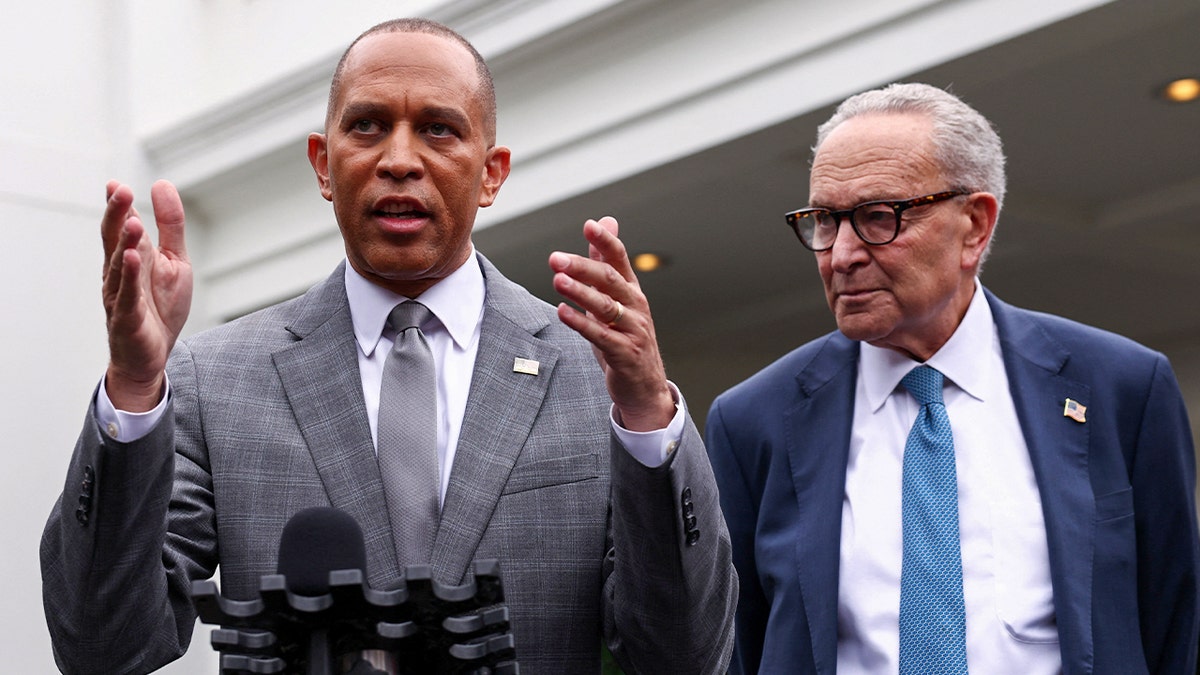
House Minority Leader Hakeem Jeffries, D-N.Y., suggested Americans are «crystal clear» on who shoulders the blame for the shutdown. (Kevin Lamarque/Reuters)
However, some lawmakers doubt that voters care about who «shut down the government.»
«My constituents don’t care about the finger pointing. They just want us to govern,» said Rep. Madeleine Dean, D-Pa.
As the impasse deepens, the Senate shifted from parliamentary posturing to ecumenical intercession.
«On this third day of the government shutdown, inspire them to work for your glory in all they think, say, and sow,» prayed Senate Chaplain Barry Black during his invocation of the Senate last week.
HERE’S WHAT TRUMP WANTS TO DO TO RESHAPE THE FEDERAL GOVERNMENT DURING THE SHUTDOWN
And then there are the sideshows. The White House sent out a meme portraying Budget Director Russ Vought as the Grim Reaper. And the president trolled Jeffries with an AI-generated social media video, casting Jeffries in a sombrero and a mustache with mariachi music playing in the background.
At the same time, Republicans warned about grave shutdown consequences.
«Real pain is being endured by real people,» said Johnson.
But in the next breath, the Speaker defended the president making light of circumstances, describing the trolling as «entertainment.»
«That’s what President Trump does. And people are having fun with this,» said Johnson.
I didn’t let that go.
«On one hand, you say this is very serious. That people have jobs on the line. On the other hand, you say, ‘oh, this is just fun and games and they’re trolling.’ Which is it?» I inquired.
«What they’re trying to have fun with, trying to make light of, is to point out the absurdity of the Democrats’ position,» answered Johnson.
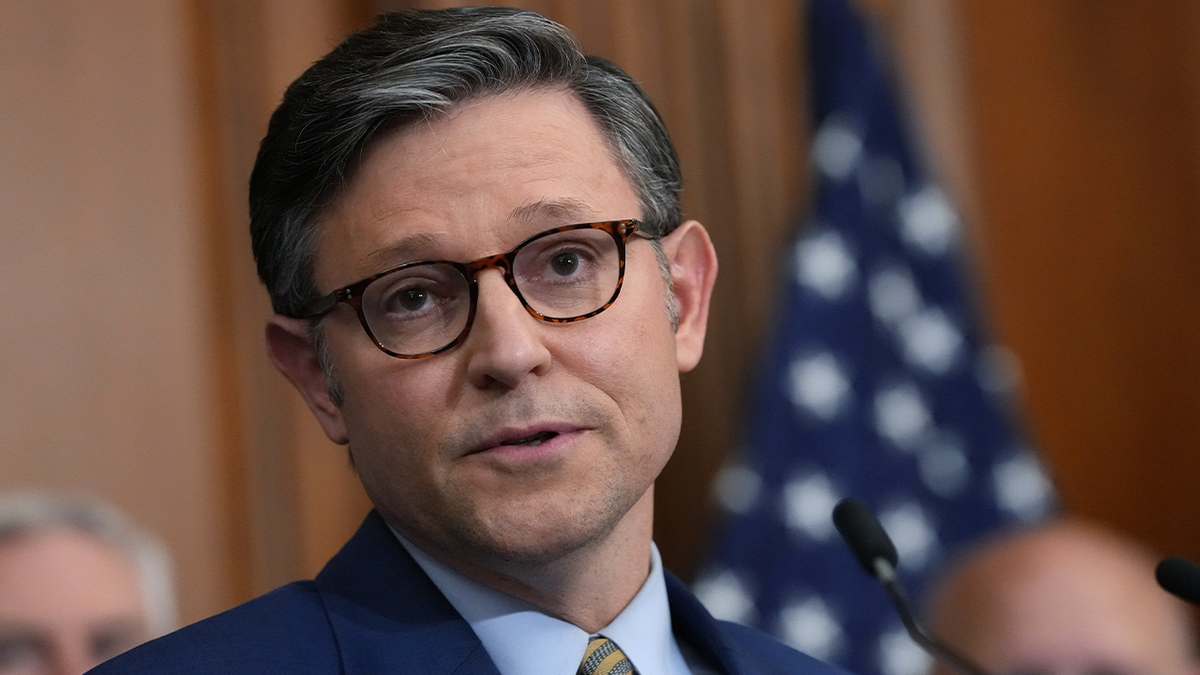
House Speaker Mike Johnson, R-La., defended President Trump’s making light of current circumstances as «entertainment.» (Kevin Dietsch/Getty Images)
So we don’t know if or when Vought will drop the anvil on federal workers. But one senator who caucuses with the Democrats and voted for the GOP plan, signaled his support could wane if Republicans overplay their hand.
«If they start firing thousands of people or clawing back other kinds of programs, I think, it could hurt their chances of getting this resolved,» said Sen. Angus King, I-Maine.’
The Senate has now blocked the House-approved spending package on six separate occasions. The sides are having casual conversations. But nothing has happened.
CLICK HERE TO GET THE FOX NEWS APP
It’s as though Congress is on a merry-go-round to nowhere, just going around and around. Everyone’s getting dizzy. And just wants to dismount.
congress,government shutdown,house of representatives politics,senate,white house
INTERNACIONAL
Europa, entre la guerra de Ucrania, el acoso ruso y la crisis política en Francia, que amenaza al euro
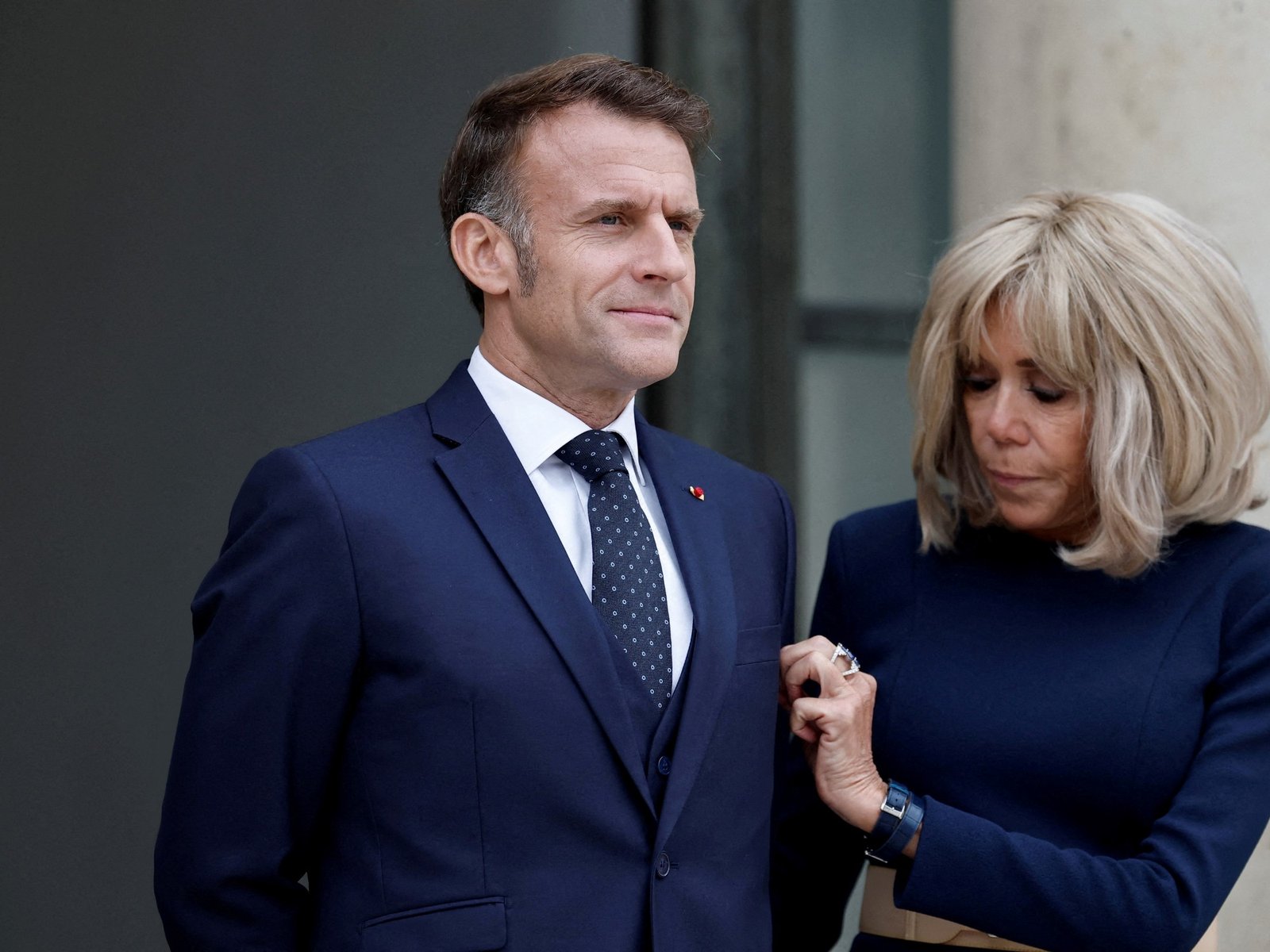
Francia, un caso sistémico
Júpiter se esfumó
¿Y ucrania?

 CHIMENTOS3 días ago
CHIMENTOS3 días agoMica Viciconte confesó por qué no fue a conocer a su primer sobrino: “Me cuesta, no me hallo”

 POLITICA3 días ago
POLITICA3 días agoEn la antesala de la elección de la CGT, los gremios del transporte refuerzan su conducción y su perfil opositor a Milei

 CHIMENTOS2 días ago
CHIMENTOS2 días agoQuién es la Gran Hermano que se separó y se puso de novia con un futbolista argentino: «Catalina Gorostidi está con Germán Ferreyra»









